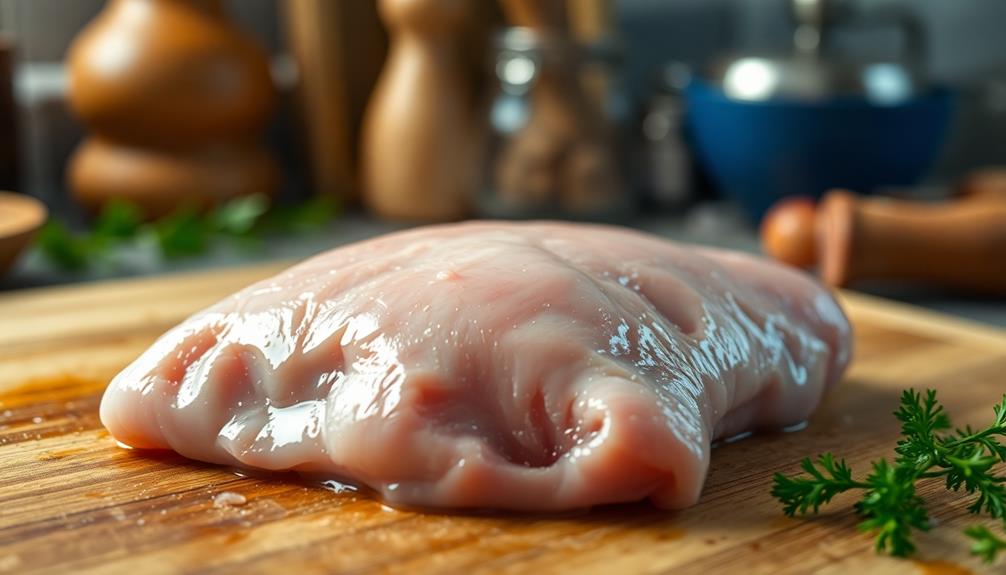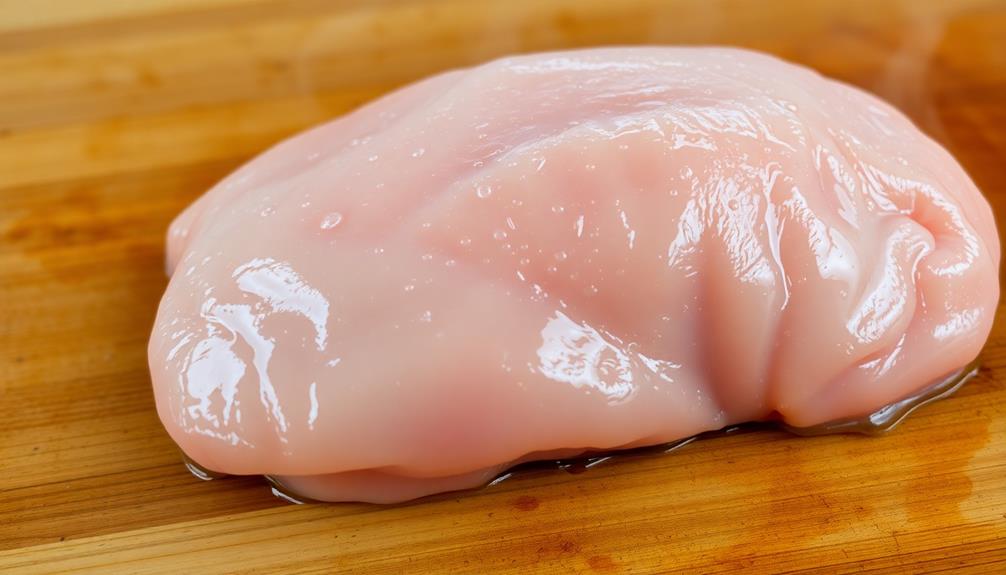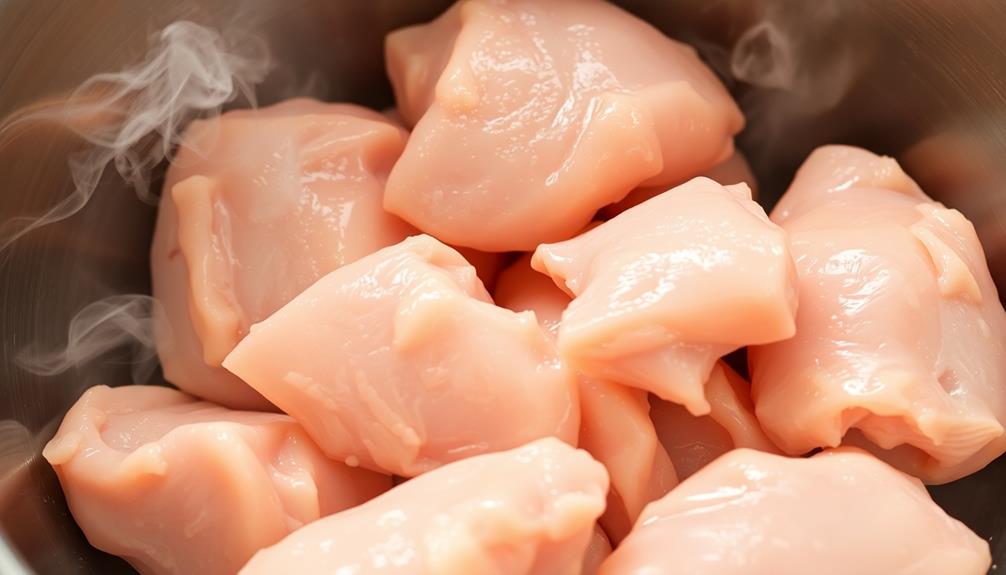When you open fresh raw chicken, you should notice a mild or neutral smell—this is perfectly normal! If you catch a strong, sour, or fishy odor, it's a red flag that the chicken may be spoiled and unsafe to eat. Fresh chicken should feel firm and not sticky. A slight aroma is expected, but anything resembling rotten eggs or sulfur means it's time to toss it out. Always trust your nose! Understanding these smells helps keep meals safe and enjoyable. If you want to know more about chicken safety and cooking tips, stick around for some great insights!
Key Takeaways
- Fresh raw chicken typically has a mild or neutral smell without any strong odors.
- Strong, sour, or sulfur-like odors indicate that the chicken has spoiled and should be discarded.
- A faint scent resembling hard-boiled eggs may suggest bacterial presence, signaling spoilage.
- Fresh chicken should feel firm and moist, not sticky or tacky, which can also impact its smell.
- Always perform a smell check before cooking, as unpleasant odors indicate potential food safety issues.
Introduction

When it comes to the freshness of raw chicken, awareness is crucial. You want to ensure the chicken you're handling is safe to eat. Fresh raw chicken typically has little to no smell, maybe a slight natural aroma, but nothing offensive. If you notice a strong, sour, or sulfur-like odor, it's a clear sign that the chicken has gone bad. In such cases, it's best to discard the chicken to avoid any risk of foodborne illness.
Remember, not everyone has the same sensitivity to smells, so it's important not to rely solely on your nose. Visual checks are essential too. Look for any discoloration or sliminess, as these can indicate spoilage.
Additionally, textural checks can help; fresh raw chicken should feel firm and moist, not sticky or tacky.
If you detect any unusual smells or see anything off with the chicken, don't hesitate. Just discard the chicken! Your health is more important than taking chances.
Description of the Smell

The smell of raw chicken can vary significantly, serving as a key indicator of its freshness. When you first open the package, fresh raw chicken typically has a mild or neutral smell with little to no odor, which is completely normal.
However, if you notice a strong, sour, or sulfur-like odor, that's a clear sign the chicken has spoiled and shouldn't be consumed.
Sometimes, raw chicken might've a faint scent reminiscent of hard-boiled eggs, which can indicate the presence of certain bacteria. This smell can also signal that the chicken is going bad.
If you detect a strong fishy or off-putting smell, it's crucial to understand this is a warning sign of bacterial growth, meaning the chicken is unsafe to eat.
Always trust your sense of smell. If any unpleasant or unusual odors arise, it's best to discard the chicken immediately.
Source and Composition

Understanding the source and composition of raw chicken helps explain its smell. Raw chicken has a natural, mild scent, often described as slightly metallic or akin to fresh meat. This scent mainly comes from its composition, which includes proteins and water.
When you open a package of fresh raw chicken, you shouldn't notice any strong odors. If you do, it might be a sign that the chicken is spoiled.
Sometimes, when raw chicken is vacuum-sealed, it may give off a temporary sulfur-like smell. This occurs because anaerobic bacteria produce hydrogen sulfide in the absence of oxygen. Don't worry; this smell usually goes away once the chicken is exposed to air.
Fresh raw chicken should smell neutral and clean. If you detect any fishy, sour, or strong sulfur-like odors, it's best to avoid consuming it, as these are indicators of spoilage.
Spoilage bacteria can change the smell of raw chicken, resulting in unpleasant odors resembling rotten eggs. Keeping these points in mind will help you ensure that the chicken you're preparing is fresh and safe to eat.
Typical Scenarios or Environments

In many grocery stores, you'll find that fresh raw chicken typically has a mild, neutral scent that reassures you of its freshness. However, older chicken can develop a strong, sour, or sulfur-like odor, which is a clear sign of spoilage.
When you unpack raw chicken at home, a faint smell should greet you, but if you detect any strong fishy or rotten egg odors, it's time to toss it out.
In cold storage environments, like freezers, raw chicken may hold onto a slight odor due to cryovac packaging. This smell usually fades once the chicken is exposed to air.
During food preparation, keep an eye (and nose) on the chicken. If it emits an off-putting smell, that's a significant indicator that it mightn't be safe to eat.
Different cuts of chicken, like breasts or thighs, can have slightly varied scents, but any strong, unpleasant smell suggests spoilage. Always check the expiration date before cooking.
Emotional or Cultural Associations

Nostalgia often fills the air when you catch a whiff of raw chicken, as it can transport you to family gatherings and cherished traditions. The smell of raw chicken might remind you of cooking with loved ones, sharing recipes passed down through generations, and the comfort that comes from those familiar flavors.
It holds cultural memories that connect you to your heritage, making meal prep feel special. In many cultures, the aroma of fresh raw chicken brings excitement and anticipation. You might feel a sense of pride as you prepare beloved dishes, knowing you're reinforcing communal bonds.
When you smell that raw chicken, it could spark emotional responses linked to happy times spent around the dinner table, surrounded by family. Some people find the scent appetizing, seeing it as a sign of culinary potential. Others, however, might feel uneasy due to food safety concerns.
Regardless, the smell of raw chicken plays an important role in how we connect with our food and each other, reminding us of the joy that comes from gathering and sharing delicious meals.
Health or Safety Considerations

While you might associate the smell of raw chicken with fond memories, it's crucial to prioritize health and safety when handling it. Raw chicken should have a minimal or mild aroma. If you notice any strong, sour, or pungent odors, that's a red flag. Such unpleasant odors can mean the chicken is spoiled and could pose a risk of bacterial contamination.
Watch out for smells resembling rotten eggs, sulfur, or fishiness; these are clear signs the chicken is unsafe to eat. When you open the packaging, take a moment to assess the smell. If it's off, trust your instincts and discard the chicken to avoid foodborne illness.
While proper cooking can kill bacteria, like Salmonella, that might be present in spoiled chicken, the initial smell assessment is essential for food safety.
Final Thoughts

When it comes to raw chicken, understanding the importance of smell can make all the difference in ensuring food safety. The smell of fresh raw chicken is usually a mild, neutral aroma.
If you detect strong, sour, or even fishy odors, it's a sign that the chicken has gone bad and should be discarded immediately. Spoiled chicken can emit unpleasant odors, like those reminiscent of hard-boiled eggs or rotten eggs, which indicate it's no longer safe to eat.
Sometimes, packaging like Cryovac can create temporary odors that go away once you open it. That's why it's crucial to take a moment and do a thorough smell check.
If you're ever unsure about the freshness of your raw chicken based on its smell, it's best to play it safe. Remember, foodborne illness is no joke, and it's always better to toss questionable meat than risk getting sick.
Frequently Asked Questions
Is Chicken Ok if It Smells a Little?
If chicken smells a little, you should be cautious. A slight odor can be normal, but if it's strong or off-putting, it's best to discard it to avoid potential foodborne illness. Stay safe! When determining if chicken is still safe to eat, trust your senses. If you’re unsure, take note of what spoiled chicken smells like—it’s often described as sour, ammonia-like, or just unpleasant overall. Always remember that when in doubt, it’s better to be safe than sorry when it comes to food safety.
How Do I Know if Raw Chicken Is Bad?
To know if raw chicken's bad, check for a sour smell, discoloration, or sticky texture. Fresh chicken should feel moist but not slimy. Always verify the expiration date and trust your instincts for safety.
Does Raw Chicken Smell Slightly Funky?
Yes, raw chicken can smell slightly funky at times, especially if it's vacuum sealed. However, if the odor is strong and unpleasant, it's best to discard it to avoid any health risks. Trust your nose!
What Is the Smell of Raw Chicken Breast?
When you handle raw chicken breast, you'll notice it has a minimal smell, often slightly metallic. If you detect strong, sour, or fishy odors, it's best to discard it to avoid health risks.









